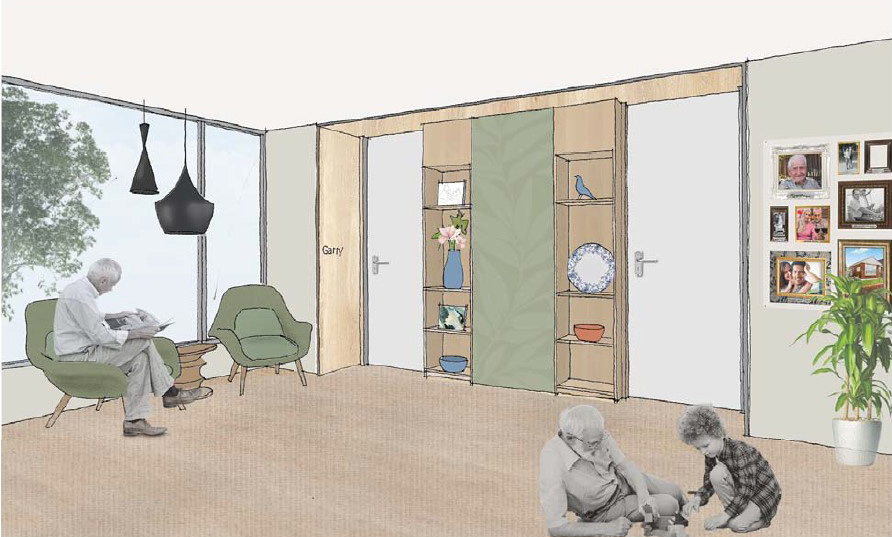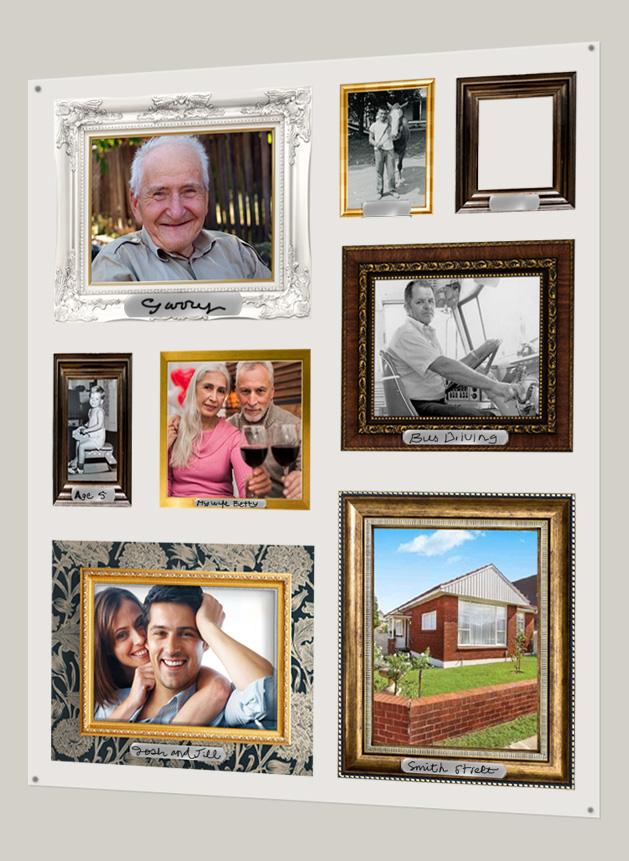
Photo Message Boards
A reusable, easier way to create tidier home-like vibes
and non-verbal conversation cues
This is a tool that quickly informs staff key information about what is important to a resident living with dementia living in an Aged Care Home setting.
Dopamine Release
1. Neurotransmitter Impact: Meaningful conversations trigger the release of dopamine, a neurotransmitter associated with pleasure and reward, in the brain of individuals with dementia. This can enhance their mood and create a sense of joy and satisfaction.
2. Motivation and Engagement: Dopamine release is linked to motivation and engagement. Regular, positive interactions can contribute to increased motivation, fostering a more active and participatory lifestyle for individuals living with dementia.
Reduction in Depression
3. Reduction in Depression: Ongoing and meaningful conversations have the potential to regulate neurotransmitters associated with mood, such as serotonin. Serotonin imbalances are often linked to depression, and positive social interactions can help maintain a more balanced neurotransmitter profile.
4. Cortisol regulation: Conversations can also contribute to the regulation of cortisol, the stress hormone. Reduced cortisol levels are associated with lower stress and anxiety, contributing to a more positive emotional state and a decreased risk of depression.
Cognitive Stimulation
5. Neuroplasticity: Engaging conversations stimulate neuroplasticity, the brain’s ability to form and reorganize synaptic connections. Regular cognitive stimulation supports overall brain health and can slow down cognitive decline associated with dementia.
6. Memory Enhancement: Meaningful interactions may evoke memories and cognitive processes, providing cognitive exercise that can potentially enhance memory recall and cognitive function.
Social Connection
7. Oxytocin Release: Positive social interactions, including meaningful conversations, can stimulate the release of oxytocin, a hormone associated with social bonding and trust. This fosters a sense of connection and well-being for both individuals with dementia and care staff.
8. Emotional Resilience: Establishing and maintaining strong social bonds can contribute to emotional resilience, helping individuals cope better with the challenges associated with dementia.
Images Courtesy Crosier Scott Architects Collaboration with Tailored Artworks in the Australian government’s Reimaging Where We Live Design Ideas Competition (C)2024

Industry Consultation
When in conversation with the Associate Executive Director of Dementia Training Australia, Jason Burton, we asked him what products the Residential Aged Care Industry had that they had not yet been able to resolve. As a result of Jason’s answer, we created our Photo Message Boards with these benefits:
– Adhere photos on the rear of the board
– Boards come A1 Fire Rated B1 as decorative, decluttering focal points
– Ready to hang portrait or landscape. Lift up and off to easily replace photos
– Translucent board shows wall colour for a less institutional aesthetic
– 8 (eight) varying sizes of opaque photo frames suit old and new photos
– Opaque frames hide blue tack or Sticky Tape
– Clear plaques provide space for messages using a white board marker
– Remove messages with a rag or tissue
– Matt ink frames reduce glare and reflection
– Photos are protected by the board for easy cleaning and neat presentation


Ways to use Decorative Photo Message Boards
– In resident rooms: increases recognition of their room
– Outside Room Doors: Aids with room door wayfinding, can replace memory boxes
– Staff photos: Repaces hospital-like pinboards and meets new design Aged Care Design Principles in community areas
– Resident artworks: Neatly collects and commemorates small artworks
– Bus Trips Out: Easily show photos of day’s out for reminiscence, sense of community and telling stories to visitors
Contact us today for a quote on your Photo Message Boards

Contact us now to receive our full catalogue of dementia-friendly products!
